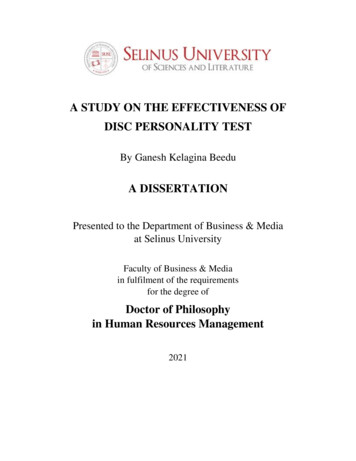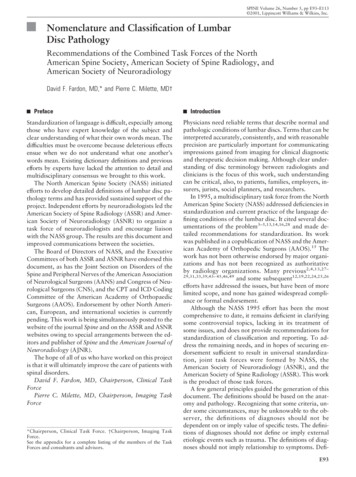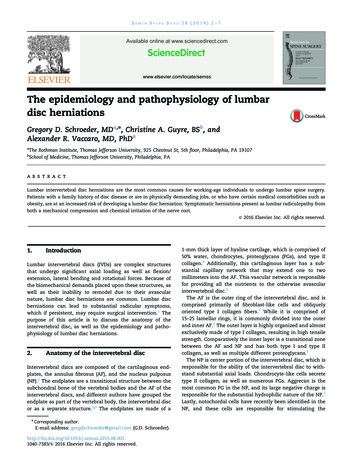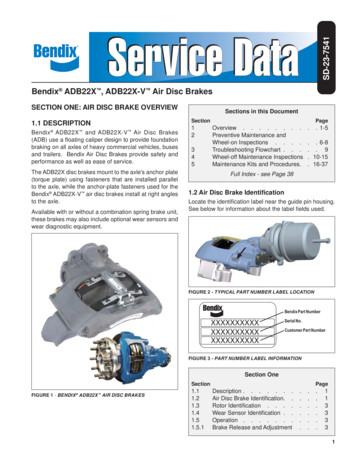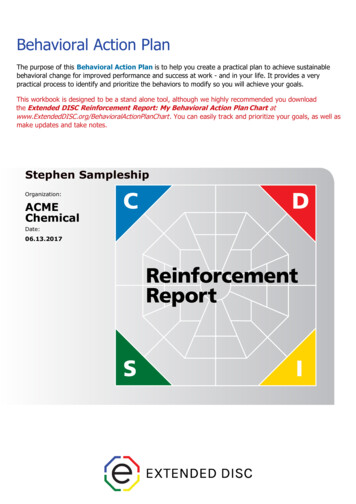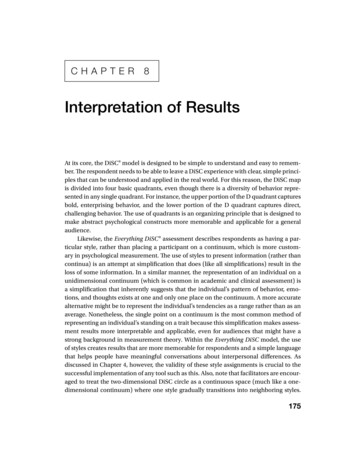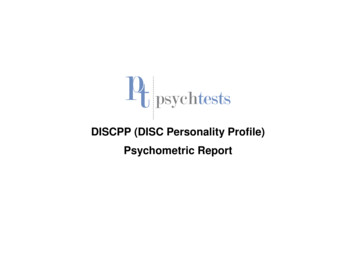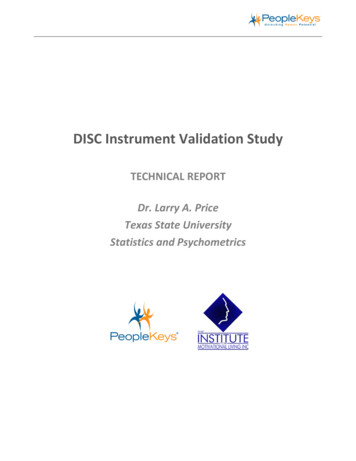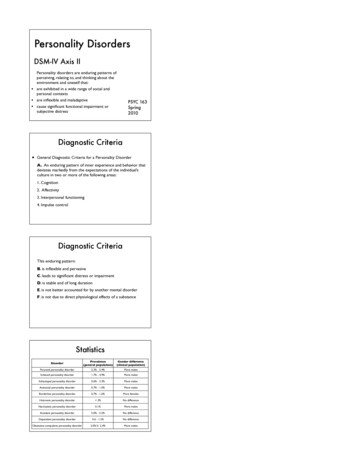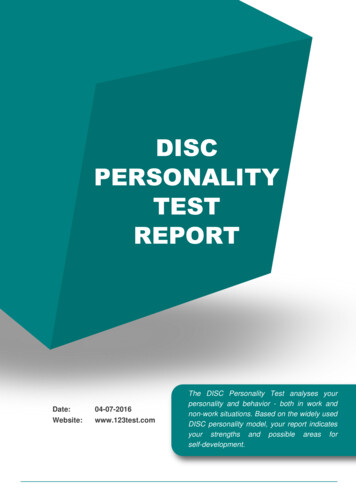
Transcription
w.123test.comThe DISC Personality Test analyses yourpersonality and behavior - both in work andnon-work situations. Based on the widely usedDISC personality model, your report indicatesyour strengths and possible areas forself-development.
12IntroductionYour personality - as well as skills and experience - has a tremendous impacton your work success, personal growth and relationships.The DISC Personality Test analyses your personality and behavior - both inwork and non-work situations. Based on the widely used DISC personalitymodel, your report indicates your strengths and possible areas forself-development. Maximize the qualities that will support you in achieving yourgoals. Minimize or compensate for the qualities that may impede your progresstowards your goals.This report does not pretend to be 100% accurate - all personality testmeasurements contain some error.This report consists of nine chapters and two appendices. These are:1. What is DISC?2. Your DISC score3. Your typical behaviour4. Your profile: The Individualist5. Your organizational value6. Tactics & Strategies for increased effectiveness7. Career options8. The profile most unlike you9. Further suggestionsAppendix A. Description of all profilesAppendix B. DISC Trait descriptionsEnjoy reading your personal DISC Personality Test Report!Test taken on 04-07-2016DISC Personality Test ReportPage 23
121. What is DISCThe DISC Theory was developed by William Moulton Marston in the 1920's.(W. M. Marston: 1893-1947, Harvard graduate, lawyer, psychologist andeducational consultant.) Since then the theory has been refined and validatedby many eminent psychologists and HR professionals. Tests based on thismodel have been administered more than 50 million times throughout theworld to help select and develop people.In short, DISC is a quadrant behavioral model to examine the behavior ofindividuals in their environment or within a specific situation. It thereforefocuses on the styles and preferences of such behavior.There are four main personality traits with the DISC model. These traits are:DominanceDescribes the way you deal with problems, assert yourselfand control situations.InfluenceDescribes the way you deal with people, the way youcommunicate and relate to others.SteadinessDescribes your temperament - patience, persistence, andthoughtfulness.ComplianceDescribes how you approach and organize your activity,procedures and responsibilities.The DISC theory is often visualized as a quadrant where the top/bottom andleft/right sides represent specific behavioral tendencies. People who score highon Dominance and Compliance tend to be more task-oriented where peoplescoring higher on Influence and Steadiness are more people-oriented. Thosescoring high on Dominance and Influence are generally more assertive andTest taken on 04-07-2016DISC Personality Test ReportPage 33
12active, higher scores on Compliance and Steadiness give rise to calm andmore cautious behavioral TIVECALMCAUTIOUSThe dimensions of the DISC model are not necessarily dependent on eachother. This means that your score on one dimension does not determine yourscores on any of the other dimension. With different scores on each of the fourtraits there are nearly unlimited possible outcomes in combined scores. Foryour convenience, 15 profiles have been identified as a good coverage of allthe possible outcomes. In alphabetical order, the profile names are:The Achiever, The Coach, The Counselor, The Creative, The Enthusiast,The Evaluator, The Individualist, The Inspirational, The Investigator, TheObjective Thinker, The Perfectionist, The Persuader, The Practitioner,The Results-Oriented and The SpecialistFor a detailed description of each of the profiles, please refer to Appendix A.Test taken on 04-07-2016DISC Personality Test ReportPage 43
122. Your DISC ScoreYour specific distribution of scores on the DISC personality test is an indicationof your unique personality. You can think of this as your DISC Personality'DNA'. In the chart below you see your distribution of scores.YOUR DISC LEOMPLIANCEPlease note that scoring higher or lower on any of the dimensions does notcorrespond with better or worse scores. Scores to either side correspond dareasforself-development. Your most distinct score (either to the left or right) is likely topoint to your most typical personality characteristics. The second most distinctscore points to your next most typical characteristics and so on.Test taken on 04-07-2016DISC Personality Test ReportPage 53
123. Typical BehaviorEvery personality type has its own typical behaviors, idiosyncrasies andspecific descriptions. In the list below your personality profile is described ineasy-to-read, to the point sentences.Your responses indicate that you .Dominance thrive on competition and challenge. are goal orientated and want the freedom to do it your way. are resourceful, aim high and want authority. are self-sufficient and individualistic. tend to be direct and positive with people.Influence are comfortable working alone. tend to take little at face value. have a tendency to be focused. Once you have sorted out the factsyou go for the goal. only bring into play your social skills when logic/circumstance dictates.Steadiness get restless and bored when involved in routine and repetitivework/activities. need change and variety in your work and non-work life. enjoy stretching yourself intellectually and physically.Compliance are independent and uninhibited. feel restrained by rules and restrictions. prefer to be measured by results. are willing to try the untried. feel that 'detail' and routine work is best 'delegated' - done by others.Test taken on 04-07-2016DISC Personality Test ReportPage 63
124. Your ProfileAs you will appreciate, there are literally thousands of different combinations icationandunderstanding, DISC Personality Model experts have defined - throughstatistical analysis of the graph combinations - fifteen DISC 'Patterns' or'Profiles'.The 'Profiles' are given names. The objective of these names is to give a singledescriptive term that captures the essence of that Pattern.The Profile that is most similar to your personality profile is frequently called'The Individualist'.Your profile: The IndividualistDIYou are self-reliant and individualistic. You arelikely to treat team goals as personal goals. Youhave a high sense of personal accountability andset very high standards for others. You tolerateworking under pressure and you are unlikely to sm may reduce your effectiveness whenworking as a member of a team. When faced withopposition, you are likely to respond by becomingeven more persistent, forceful and innovative.Test taken on 04-07-2016DISC Personality Test ReportPage 73
125. Tactics & Strategies for IncreasedEffectivenessDevelop and use your empathy. Make an extra effort to see the situationthrough the other person's eyes. Remember, although you may be thestrongest member you are still 'part of a team'.6. Organizational valueEvery personality type has its own unique value for an organization. Yourprime value to an organization is: Your ability to focus and not be side-tracked from your drive to achievean objective Your responsiveness to change and ability to be inventive when facedwith problems Your capacity to function without the support and encouragement ofothers.7. Career optionsBased on your personality profile we suggest that you particularly considerjobs that allow you to reach solutions on your own. Work that involves a gooddegree of change and new challenges.Obviously when considering career options, you have to take into d/transferableskills,experience and your own personal financial needs.Test taken on 04-07-2016DISC Personality Test ReportPage 83
128. The profile most unlike youIn life you may experience compatibility, relationship and effectivenessproblems when dealing with people of other profiles. Such problems can striketeam performance; managing people or being managed; social situations,family issues, acute problem solving at work; achieving life goals and in alarger sense your enjoyment of life and career success.You can limit such problems or even overcome them by first simply realizingthe fact that people differ. Subsequently appreciate and even celebrate thesedifferences! If all were alike, society would be crippled. When you understandhow other people act, react, think and decide, your personal and jointeffectiveness with others can be significantly enhanced!It is not possible to describe every interaction of you with all other types inevery situation in this report. There are simply too many. This chapter istherefore limited to describing the one other profile of which knowing it well willbenefit you most. Namely the one that is most unlike you.DIThe profile most unlike your profile is 'ThePractioner'. You will most likely not recognizeyourself in most of the descriptions of 'ThePractioner':CSYOUR PROFILETHE PRACTIONERTest taken on easant; verysociable; stable; fact-finder;accurate; systematic; diplomatic; courteous;restrained; analytical.DISC Personality Test ReportPage 93
129. Further suggestionsSharing your report and getting feedbackYou might like to share your report with other people who know you well, bothin work and non-work situations. Ask them if they think that it is an accuratedescription of your personality.Resume/CVIf you are a job seeker we suggest that you might also like to let a prospectiveemployer know your strengths and key values to an organization as defined bythis DISC Personality Test. So why not include these on your Resume/CV? Forexample you could copy and paste the following:I have taken the DISC Personality Test at www.123test.com.Here is an extract from my report:Your prime value to an organization is: Your ability to focus and not be side-tracked from your drive toachieve an objective Your responsiveness to change and ability to be inventivewhen faced with problems ement of others.Test taken on 04-07-2016DISC Personality Test ReportPage 103
12Appendix A. Description of all profilesThe ual;persistent;independent; stubbornThe CoachWeighs pros & cons; listens; persuasive; trusting; team-person;easy to get on with; supportive; mature; avoids conflictThe influential;team-player; loyal; patient; sensitiveThe CreativeDominant; forceful; factual; logical; alert; critical; analytical;practical; perfectionist; innovative; sets high standardsThe EnthusiastEnthusiastic; gregarious; influential; sociable; generous; charming;alert; eager; optimistic; change-orientedThe EvaluatorCompetitive; decisive; quick; enthusiastic; persuasive; influential;critical; analytical; sets high standardsThe IndividualistSelf-assured and confident; forceful; logical; change-orientated;independent; single-minded; decisive; tough; focusedThe ve;self-promoting;change-oriented; active; stubborn; independentThe ic;perfectionist;determined; dogged; stubborn; dispassionateThe Objective ThinkerQuiet; dependable; modest; conservative; realistic; controlled;logical; factual; alert; critical; stable; perfectionist; systematic;careful; analytical; conventionalThe cise;accurate;persuasive;sociable;predictable; controlledThe ect;demandingThe PractitionerConservative; realistic; evaluating; pleasant; sociable; stable;fact-finder; accurate; systematic; diplomatic; courteous; restrained;analyticalThe Results-OrientedDemanding; direct; egocentric; self-assured; change-oriented;frustrated by lack of progress; persistent; determined; stubborn;independent; 'own person'The l;logical;stable;deliberate; patient; analytical; conventional; systematic; accurateTest taken on 04-07-2016DISC Personality Test ReportPage 113
12Appendix B. DISC trait descriptionsTo help you understand the DISC model of personality here are some descriptions ofeach of the factors measured. Descriptions are shown for people who scorecomparatively high and comparatively low.Dominance - Comparatively Highenjoy competition and challenge.are goal orientated and want to be recognized for their efforts.aim high, want authority and are generally resourceful and adaptable.are usually self-sufficient and individualistic.may lose interest in projects once the challenge has gone and they tend tobe impatient and dissatisfied with minor detail.They are usually direct and positive with people, enjoying being the centre ofattraction and may take it for granted that people will think highly of them. They mayhave a tendency to be rather critical of others. Consequently, other people may tendto see them as being rather domineering and overpowering. Dominance - Comparatively Lowtend to want peace and harmony.prefer to let others initiate action and resolve problems.are quiet and indirect in their approach to most situations.are usually cautious and calculate risks carefully before acting.They are generally well liked because of their mild and gentle nature. Other peoplewill tend to see them as being patient, calm, thoughtful and a good listener. Influence - Comparatively Highare strongly interested in meeting and being with people.are generally optimistic, outgoing, and socially skilled.are quick at establishing relationships.Sometimes their concern for people and people's feelings may make them reluctant todisturb a favorable situation or relationship. Influence - Comparatively Loware usually socially passive.quite frequently have an affinity for things, machinery and equipment.are generally comfortable working alone.frequently have a tendency to be analytical and once they have sorted thefacts out they communicate them in a straightforward direct way.tend to take little at face value.They may well have learned and developed good social skills but they only bringthese into play when logic dictates such tactics. Test taken on 04-07-2016DISC Personality Test ReportPage 123
12Steadiness - Comparatively Highare usually patient, calm and controlled.have a high willingness to help others particularly those they consider asfriends.Generally they have the ability to deal with the task in hand and to do routine workwith patience and care. Steadiness - Comparatively Lowtend to enjoy change and variety in their work and non-work life.are expansive by nature and tend not to like routine and repetitivework/activities.They enjoy stretching themselves intellectually and physically. Compliance - Comparatively Highare usually peaceful and adaptable.tend not to be aggressive.tend to be cautious rather than impulsive.avoid risk-taking.act in a tactful, diplomatic way and strive for a stable, ordered life.are comfortable following procedures in both their personal and business life.They prefer sticking to methods that have proved successful in the past. They have ahigh acceptance of rules and regulations. Compliance - Comparatively Loware independent and uninhibited.resent rules and restrictions.prefer to be measured by results and are always willing to try the untried.Free in thought, word and deed, they long for freedom and go to great lengths toachieve it. They feel that repetitive detail and routine work is best "delegated" oravoided. Test taken on 04-07-2016DISC Personality Test ReportPage 133
123Contact us at info@123test.comAll rights reserved. Copyright 2016 123test .Test taken on 04-07-2016DISC Personality Test ReportPage 14
Test taken on 04-07-2016 DISC Personality Test Report Page 11. Appendix B. DISC trait descriptions To help you understand the DISC model of personality here are some descriptions of each of the factors measured. Descriptions are shown for people who score comparatively high and comparatively low.
